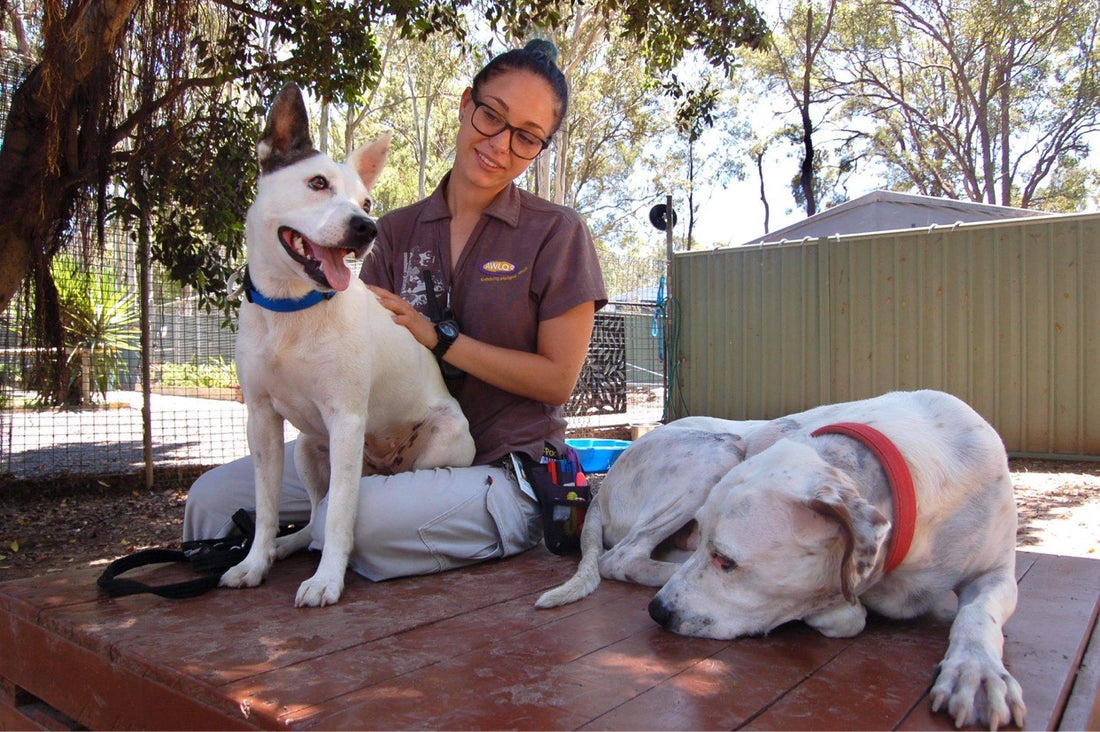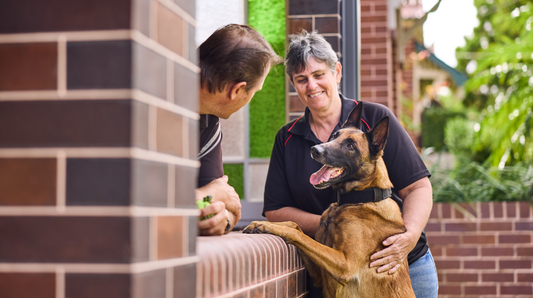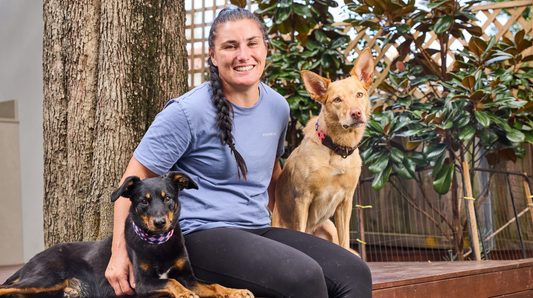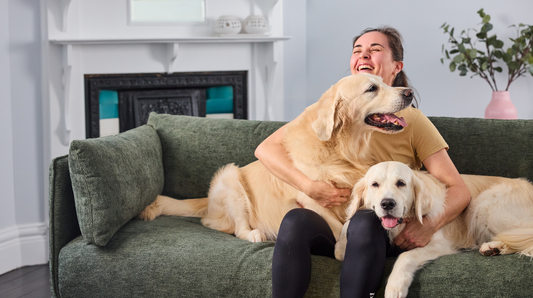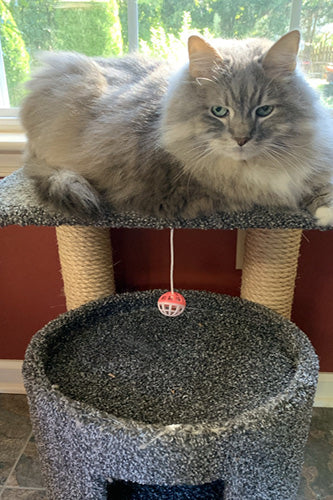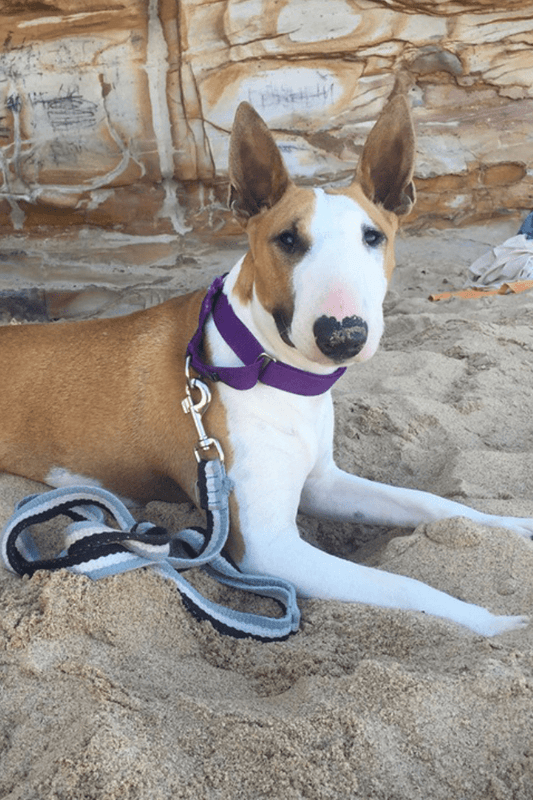You Can’t Buy Love but You Can Rescue It
Rescue Dogs
with Animal Welfare League Gold Coast Rehoming Supervisor Mikaela
Tell us about yourself, your background and how you got into dogs?
I grew up with family dogs and when I first moved out of home, I so badly wanted a dog of my own. I went into Animal Welfare League Queensland looking for a dog to adopt, I really wasn’t in the position at the time to commit to a dog so I began volunteering and three dogs and two cats later the rest is history!

How long have you been at the AWLQ?
I volunteered for two years and have now been employed for nearly 6.
What is your current role and what are you responsible for?
My current role at AWLQ is Rehoming Supervisor at the Gold Coast Centre, I work amongst all areas of the shelter including dogs, cats, pocket pets, birds and also in our two clinics. I carry out dog behavioural assessments, assist with the rehoming processes and adoptions. My favourite part of my job currently is assisting regional and city pounds who don’t have rehoming programs with their unclaimed animals – we take their animals and find them happy homes.
What is the best part about your job?
Adoptions! There is absolutely nothing better than seeing an animal who arrived scared or in poor health come out of its shell or make a full recovery. Seeing them leave with people who are just as excited as them is just the best feeling ever. I also LOVE mixing dogs, it’s so fulfilling when you have a dog in care that may be reactive/nervous around other dogs but when you finally find that friend that’s right for them it’s so rewarding.

What is the hardest part of your job?
Some animals do arrive at our shelter with some pretty confronting health or behavioural issues. It can be difficult to understand or even fathom what some animals have been through before arriving in care. It can also be frustrating when many of these issues could be prevented or solved with basic vet care needs being met and appropriate socialisation and training.
If someone was looking to adopt/ rescue a dog, what kind of living arrangements should they have?
I think that it’s important for anyone interested in adopting to have a think about their living arrangements and think about the kind of dogs that would suit that arrangement best and what they really want from their dog. Sometimes it can be best to tell the staff a bit about your home and property and what kind of personality you’re looking for and let us do the matchmaking for you.
For people with homes such as apartments, multi-dog/multi pet, acreage with livestock, etc. It can sometimes be less about what the dog looks or what you had in mind and more about looking at what experiences or living arrangements shelter dogs have had in the past to find the right fit.
Is there a specific type of fencing future pet parents should consider?
Every single dog is different but as a general rule of thumb, most dogs will need solid, 6ft timber fencing at a minimum to keep them safe and secure. Some dogs do require fencing adjustments put in place and/or colour bond fencing to keep them contained and others are happy living on acreage with very minimal fencing.
What are some common mis-match circumstances that can occur if new pet parents aren’t honest about their current lifestyle choices?
Not being honest about the other pets in the household, it’s so important that when adopting you’re honest about other animals to ensure the right match and so correct introductions can be done.
What are some benefits of rescuing a dog?
There are SO many homeless dogs out there, when choosing to adopt you are freeing up a kennel which means we can assist pounds and private surrenders. So you’re not just saving one life but two. Generally, most adult dogs come with good house manners and are toilet trained along with basic training so this can be easier for people not really wanting to go through the puppy stage. It can cost less as well – all our dogs are desexed, microchipped, up to date with flea, worm and vaccination, heart worm tested and any other vet procedures they require (sometimes these can be major orthopaedic surgery) are done prior to adoption which is generally a $400 adoption fee.
What are some of the challenges that come with a rescue dog?
Unrealistic expectations! Rescue dogs need time to adjust and decompress from their time spent in a shelter and they may also need further training and socialisation. Most dogs (not all) will not be ready to run off the lead at the beach or sit at a café straight away.
How is a rescue dog’s temperament tested?
Each dog is tested with another dog of the same and opposite sex along with small dogs. These tests are done both on lead and off lead. We always ensure we set our dogs up for success by matching them with dogs that are suitable but also making sure we get a fair and accurate test. We also observe their behaviour with staff and strangers, along with their response to handling.

How does the adoption process work?
All available dogs are on our website for viewing, potential adoptees can come to visit and meet the dogs (super important to bring any existing dogs along with you so we can ensure they hit it off!), if everything goes well we discuss with you all the dog’s info and care needs, we complete the adoption paperwork and you head on home to live happily ever after!
What are some key things people should consider before rescuing a dog?
What time do you have to invest in enrichment, exercise and training.
The financial aspect of caring for your new pet.
Do you recommend any kind of training or training school for future pet parents to attend?
I ALWAYS recommend to every single adopter that they invest in some group training, no matter what! There is no better way to set both yourself and your new dog up for success.


